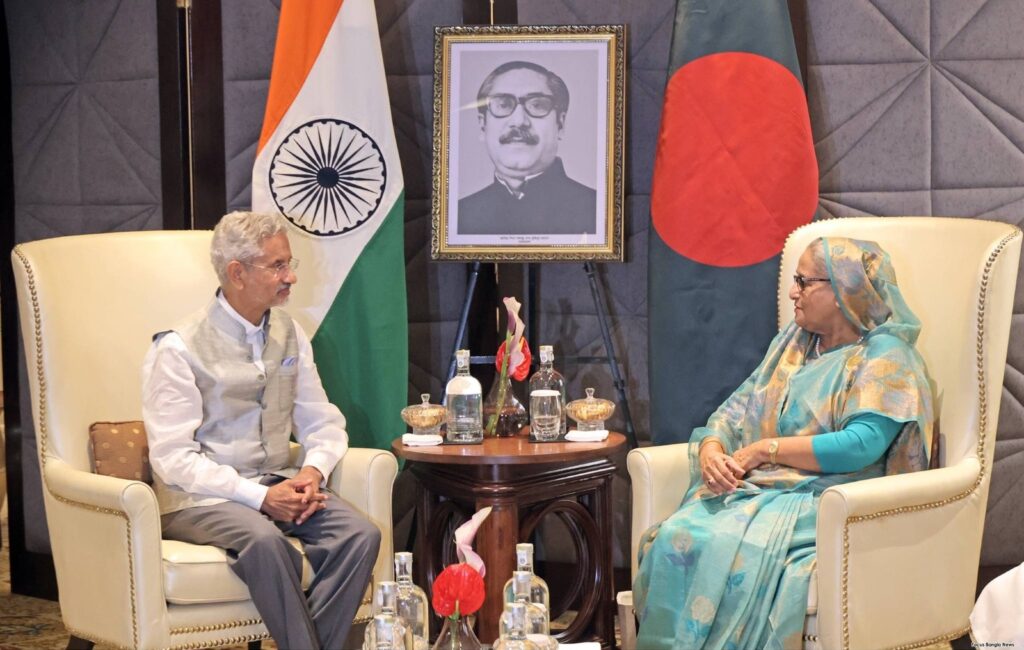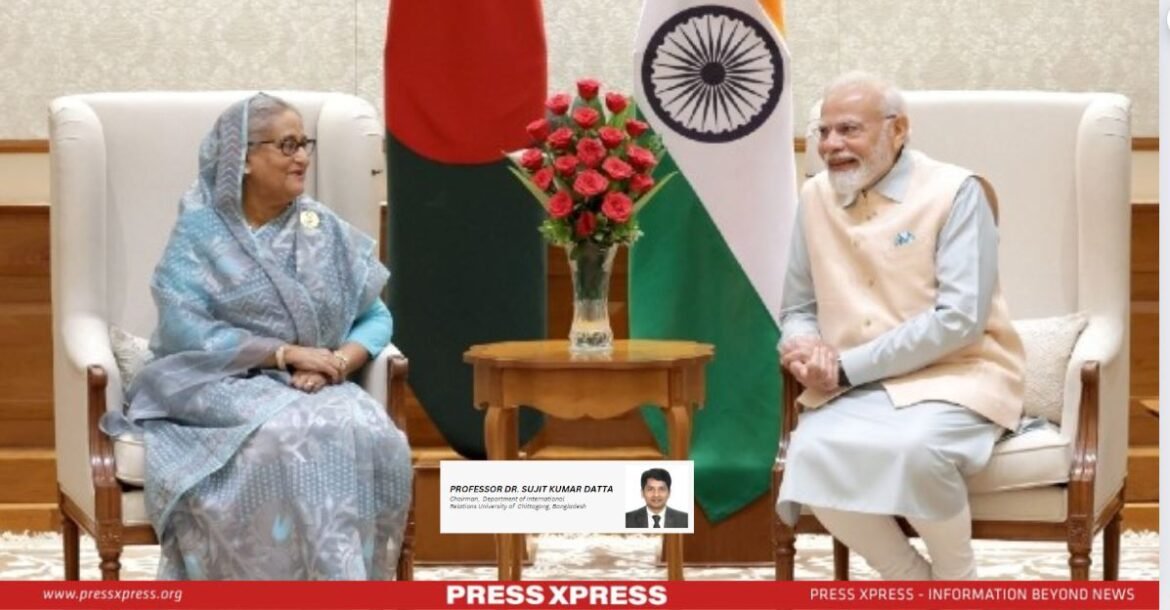In a landmark visit underscoring the deepening ties between Bangladesh and India, Prime Minister Sheikh Hasina’s official trip to New Delhi on 21-22 June 2024 marked a significant milestone in regional diplomacy. The visit, the first since Prime Minister Narendra Modi’s third consecutive term in office, underscored the strategic importance both countries attach to bilateral relations. The visit highlighted the signing of seven new Memorandums of Understanding (MoUs) covering crucial sectors such as blue economy, maritime cooperation, railway, capacity building, health, academic cooperation, fisheries, and disaster management. Bangladesh and India share a complex history shaped by geographical proximity, cultural affinities, and shared challenges. Since Bangladesh’s independence in 1971, both countries have navigated a relationship that has seen highs and lows but has generally trended towards closer cooperation in recent years. Economic ties, people-to-people connections, and security collaboration have been central pillars of this evolving relationship.
You can also read: PM Sheikh Hasina’s India Visit to Strengthen Economic Ties
In the realm of international relations, diplomatic engagements between nations play a pivotal role in shaping global dynamics. Such interactions are not merely ceremonial but are essential for fostering bilateral ties, enhancing economic cooperation, and addressing mutual concerns. One such significant visit in recent times was the visit of Prime Minister Sheikh Hasina of Bangladesh to India. From a geopolitical standpoint, closer ties between India and Bangladesh create a conducive environment for addressing regional challenges, including maritime security, transnational crime, and climate change. Moreover, collaborative efforts in economic development and infrastructure projects contribute to the realization of broader regional integration goals, such as those envisioned under the Bay of Bengal Initiative for Multi-Sectoral Technical and Economic Cooperation (BIMSTEC) framework.
Prime Minister Sheikh Hasina’s frequent visits to India underscore her administration’s commitment to enhancing bilateral ties. Her recent visit was particularly significant as it occurred within fifteen days of her last visit, signaling a proactive approach to diplomacy. The continuity in engagements at the highest level reflects mutual intent to deepen cooperation across various sectors. The cornerstone of PM Hasina’s visit was the signing of seven new MoUs, each strategically targeting critical areas of collaboration:

Blue Economy and Maritime Cooperation:
Both countries recognize the potential of their coastal regions and maritime resources. The MoU on blue economy and maritime cooperation aims to harness these resources sustainably while promoting joint research and development initiatives.
Railway: Enhancing connectivity through railway infrastructure is crucial for boosting trade and people-to-people ties. The MoU on railways aims to modernize existing infrastructure and explore new routes to facilitate smoother transport of goods and passengers.
Capacity Building:
Investing in human capital is vital for sustainable development. The capacity building MoU focuses on skill development, training programs, and exchange of expertise to enhance administrative capabilities.
Health:
Collaboration in the healthcare sector is critical, especially in the wake of global health challenges. The health MoU aims to strengthen healthcare infrastructure, share best practices, and collaborate on research and development in medical sciences.
Academic Cooperation:
Education forms the bedrock of future collaborations. The academic cooperation MoU seeks to promote student exchanges, joint research projects, and academic partnerships between institutions in both countries.
Fisheries:
Sustainable management of fisheries resources is essential for food security and economic stability. The Fisheries MoU aims to regulate fishing practices, conserve marine biodiversity, and promote sustainable aquaculture practices.
Disaster Management:
Given the vulnerability of the region to natural disasters, cooperation in disaster management is crucial. The MoU on disaster management focuses on preparedness, response mechanisms, and joint efforts in disaster risk reduction.
One of the longstanding issues between Bangladesh and India has been the equitable sharing of water resources, particularly concerning the Teesta River. The Teesta is crucial for both agriculture and livelihoods in Bangladesh and the Indian state of West Bengal. Despite previous attempts, a comprehensive agreement has yet to be elusive due to various geopolitical and domestic factors. During her visit, Prime Minister Hasina engaged in substantive discussions with her Indian counterpart, Prime Minister Narendra Modi, on the issue. A notable development was India’s commitment to sending a technical team to observe the Teesta River’s flow and gauge the feasibility of a mutually acceptable water-sharing arrangement. This step underscores a proactive approach towards resolving a critical issue that impacts millions of lives on both sides of the border.
Another significant announcement during Prime Minister Hasina’s visit was the introduction of open e-visas for medical purposes. This policy initiative marks a pivotal step forward in enhancing healthcare access and cooperation between India and Bangladesh. The open e-visa for medical purposes aims to streamline the process for Bangladeshi citizens seeking medical treatment in India, leveraging India’s advanced healthcare infrastructure and expertise.

PM Hasina’s visit to India not only strengthened bilateral ties but also had broader implications for regional dynamics. The strategic alignment between Bangladesh and India on critical issues such as connectivity, security, and economic development sends a strong message of stability and cooperation to the region. This visit also underscores India’s role as a critical partner in Bangladesh’s development trajectory, offering expertise, investments, and technological collaborations.
Looking forward, PM Hasina’s diplomatic calendar includes a potential visit to China in July 2024. China’s eagerness to invest in projects such as Teesta water management underscores the strategic choices available to Bangladesh as it balances relations between its two large neighbours. The diversification of Bangladesh’s diplomatic engagements reflects its pragmatic approach to regional and global affairs, leveraging partnerships to achieve its development goals while maintaining regional stability.
Prime Minister Sheikh Hasina’s visit to India exemplified the strategic significance of diplomatic engagements in fostering bilateral relations and advancing shared objectives of peace, stability, and development. The visit underscored the commitment of both nations to deepen cooperation across various sectors, including trade, security, energy, blue economy and cultural exchanges. By addressing mutual concerns and exploring new avenues for collaboration, India and Bangladesh have set a positive trajectory for their bilateral relationship, with profound implications for regional dynamics in South Asia.
Prime Minister Sheikh Hasina’s visit to India marked a significant step forward in bilateral relations, underpinned by the signing of seven new MoUs across key sectors. The MoUs strengthen economic and strategic ties between Bangladesh and India and pave the way for enhanced cooperation in areas critical to regional stability and sustainable development. As Bangladesh continues to navigate its diplomatic engagements with India and potentially China, the focus remains on leveraging partnerships to foster inclusive growth, address common challenges, and create a more prosperous South Asian region.


